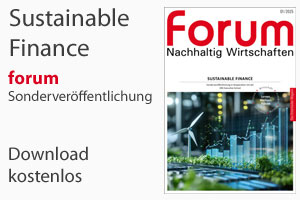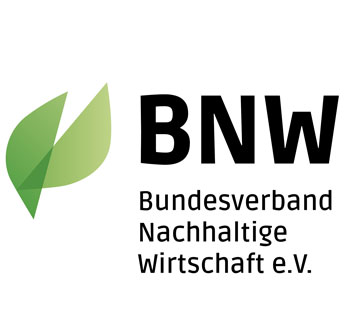Peatland breakthrough needed in Brazil
Looking to COP30 in Belém
As UNFCCC COP29 is ending in Baku, Azerbaijan, preparations are gathering pace for the next COP – which will take place in Brazil. Scientists are already now pointing out the little-noticed but huge climate potential of the peatlands of Brazil. The country’s most carbon dense ecosystem is nearly unprotected and tremendously threatened by large scale agriculture and deforestation, a new briefing paper by the Greifswald Mire Centre and partners finds.
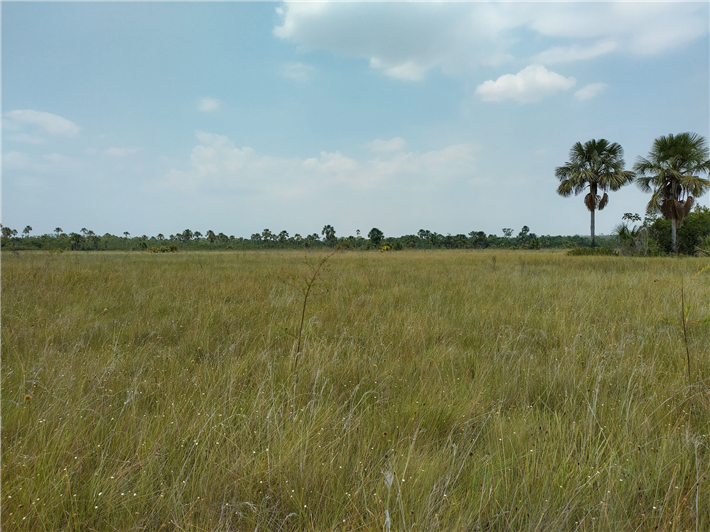 Peat swamp Savanna in the Brazilian Cerrado © Felix Beer
Peat swamp Savanna in the Brazilian Cerrado © Felix Beer"Brazil is the tropical country with the largest peatland area according to the Global Peatland Map 2.0 just published by Greifswald Mire Centre. Two thirds of it are found in Amazônia. These ecosystems are crucial for the carbon and water cycles in Brazil. However, Brazil’s peatlands are virtually not recognized nor protected, and seriously threatened by industrial scale agriculture, like soy and cattle production, deforestation and climate change. We urgently need to better understand and protect peatlands in Brazil.” says Felix Beer, one of the authors of the new briefing paper Peatlands in Brazil – the most carbon dense ecosystem under threat of Greifswald Mire Centre and partners.
Peatlands in Brazil – facts in short:
- about 17,000 km² are with peat dominant and another 209,000 km² with peat occurring in patches
- distributed in Amazonia, the Pantanal, the Cerrado savanna, the coastal areas as well as in mountainous areas and highlands
- Brazilian Amazonia, e.g. the Rio Negro basin and along river valleys, is the peatland hotspot
Brazil does not report carbon emissions from land use on organic soils to the UNFCCC. Greenhouse gas emissions resulting from e.g. peatland drainage, drought, peat fires, from agriculture and urban encroachment remain unaccounted for. Also, wetland protection in general is currently excluded from the most important Brazilian nature conservation law, the federal Brazilian Native Vegetation Protection (LPVN) Law (12,651, May 2012). Thus, activities with negative impacts such as cattle grazing and extraction of water for domestic purposes remain allowed in wetlands.
Peatlands in Brazil and their climate impact:
- the estimated carbon stock in peatlands is 39 Gt
- 3,540 square_km of organic soils are currently under land use, causing greenhouse gas (GHG) emissions of at least 18 Mt CO2-eq, probably much more
- peatlands offer further climate-related ecosystem services such as buffering water for the dry season and prevention of wildfires
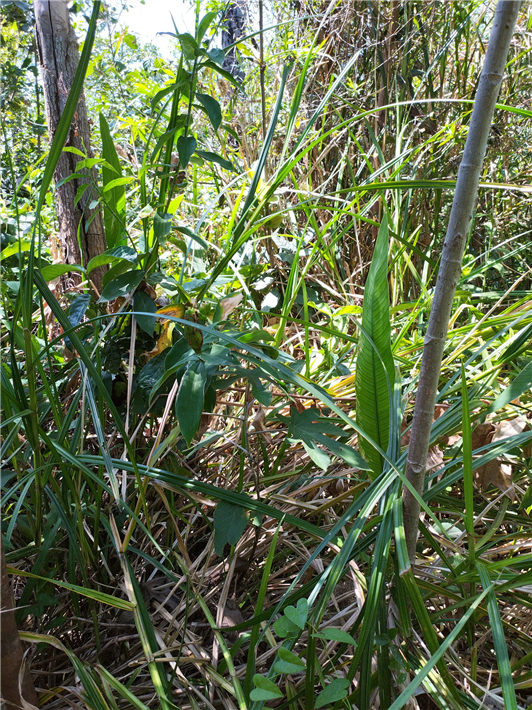 Vegetation of peat swamp forest in Brazil © Felix Beer
Vegetation of peat swamp forest in Brazil © Felix BeerThat’s why Alexandre Christofaro Silva, Professor of Forest Engineering at the Federal University of Jequitinhonha and Mucuri valley, demands: "The conservation of Brazilian peatlands is essential not only for traditional people and regional communities, but to humanity. At COP30 even in Brazil we need to have them on the agenda, and fight to stop their anthropization (fire, drainage, pasture) as we fight to stop cutting Amazonian rain forests.”
Cinthia Soto Golcher, responsible for Climate Change Advocacy at Wetlands International, suggests: "To reach the Paris Agreement goals on mitigation and adaptation, drained peatlands must be restored and rewetted. This cannot be achieved by only a few actors, but needs the mobilization of national and international stakeholders and resources. Hence, we view COP 30 in Brazil as a historic opportunity -and responsibility- for the international community to advance a significant and transformative chapter for peatlands in which they are seriously considered as part of the path towards a resilient 1.5°C planet by 2050.”
This corresponds to the recap of the climate summit just passed by Jan Peters, managing director of Succow Foundation: „COP29 highlighted once more that we need much more emphasis, political will, and funding for nature superheroes such as peatlands! Knowledge and data is clearly there, now we have to act on implementation!”
The briefing paper "Peatlands in Brazil – the most carbon dense ecosystem under threat” has been jointly produced by the Greifswald Mire Centre, Germany, the Federal University of the Jequitinhonha and Mucuri valleys, Brazil, and the Instituto National de Pesquisa do Pantanal, Brazil.
More information:
- Briefing paper: Peatlands in Brazil – the most carbon dense ecosystem under threat
- Global Peatlands Assessment
- Global Peatland Hotspot Atlas: Global Peatland Hotspot Atlas 2024 | UNEP - UN Environment Programme
Kontakt: Greifswald Mire Centre | Institute of Botany and Landscape Ecology | University of Greifswald | communication@greifswaldmoor.de | www.greifswaldmoor.de
Umwelt | Klima, 24.11.2024
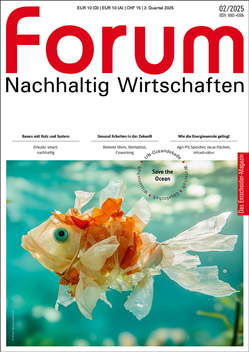
Save the Ocean
forum 02/2025 ist erschienen
- Regenerativ
- Coworkation
- Klimadiesel
- Kreislaufwirtschaft
Kaufen...
Abonnieren...
30
APR
2025
APR
2025
Franz Alt: Die Solare Weltrevolution - Aufbruch in eine neue Menschheitsepoche
In der Reihe "Mein Klima… in München"
80331 München und online
In der Reihe "Mein Klima… in München"
80331 München und online
07
MAI
2025
MAI
2025
MakerCamp Genossenschaften 2025
Genossenschaftliche Lösungen in Wirtschaft, Kommunen und Gesellschaft
65189 Wiesbaden
Genossenschaftliche Lösungen in Wirtschaft, Kommunen und Gesellschaft
65189 Wiesbaden
21
MAI
2025
MAI
2025
LVR-Kulturkonferenz 2025: Kultur. Nachhaltig. Wirtschaften.
Welchen Beitrag leistet Kultur zum wirtschaftlichen Wachstum?
47805 Krefeld
Welchen Beitrag leistet Kultur zum wirtschaftlichen Wachstum?
47805 Krefeld
Professionelle Klimabilanz, einfach selbst gemacht

Einfache Klimabilanzierung und glaubhafte Nachhaltigkeitskommunikation gemäß GHG-Protocol
Politik
 Gelassenheit und Seelenruhe
Gelassenheit und SeelenruheChristoph Quarch leistet - mit Blick auf Donald Trumps Regierungsantritt - philosophische Lebenshilfe
Jetzt auf forum:
Mut und Machen – Tollwood Sommerfestival 2025, 19. Juni bis 20. Juli in München
Chocolate Scorecard: Die guten und schlechten Ostereier der Schokoladenindustrie
Die Region Klimaberg Katschberg setzt ein deutliches Zeichen für nachhaltigen Tourismus in den Alpen
Sind wir alle viel zu geldfixiert geworden?
The Cradle: Das erste kreislauffähige Holzhybrid-Gebäude in Düsseldorf



